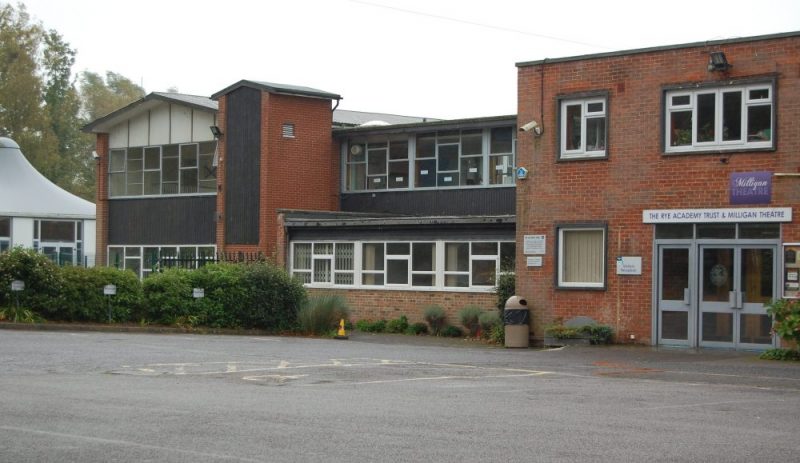Twelve months on from taking up his appointment, Rye Academy Trust Chief Executive Officer Tim Hulme reviews some of the major changes that have taken place there during the past year, and points forward to the future. What were his challenges and priorities?
He had found a loss making institution with deficits over three prior years, mounting to £750,000 for 2015-16. The first task was to turn around the financial situation and set a break-even budget for the current year, £6 million income and £6 million expenditure. He developed a recovery plan with the approval of the Department of Education and Regional Schools Commissioner. This involved painful decisions, principally concerning the Studio School which still has 80 students but is closed for new entry. What he describes as “non-pay” cost elements have been also heavily pruned.

He had inherited, he said, a dysfunctional organisation structure, with the three schools (Studio, College and Primary) all operating independently and inadequate policies not equitably applied so the Board of Trustees was not in overall control. The governing bodies have been integrated into a single trustee board and new appointments made. Stephen Ward, an ex-magistrate, is Chairman and other members include: Howard Brown, retired naval officer, Pip Gasson, an ex-deputy head teacher in Hastings, and Nicola Podd, a director if the National Association of Head Teachers. Tim Hulme paid tribute though to the unwavering support given by former trustees, Ian Potter, Niki Stuart and David Cooper. There are still vacancies for trustees with significant financial experience and the trust would be pleased to discuss these with appropriately qualified members of the local community who may have time available to support Rye schools.
The organisation structure at Rye College and Rye Studio School has been strengthened with the appointment of a new head teacher, Barry Blakelock, formerly a head teacher at the Aquinas Trust and two new deputy heads, Dom Downes and Jest Carpenter both from the Beacon Academy at Crowborough. Student numbers at the College have held up and exam results have improved, though much more needs to be done. The school curriculum has been re-shaped in line with the government’s “Progress 8” programme which gives core status to English, mathematics and science (including computer science). The other five subjects cover the humanities, history, geography and an open group of options. A new government funding-related formula measures pupils’ progress starting college to end of Key Stage 4.
The return to financial health has been assisted by a government loan grant of £1.2 million, but the outlook for small academy schools is not bright. The government is encouraging mergers to form larger educational units, comprising eight or more schools. “Trusts of our size are almost unsustainable without wider collaboration”, said Tim Hulme, “We are currently in discussion with several possible partners in Kent and Sussex to achieve stability, whilst retaining our identity”. At present, without a positive financial surplus each year, there is little scope for essential repairs and maintenance of the buildings and infrastructure. The trust has applied to the Education and Skills Funding Agency for a further grant of £550,000, and should know whether this is successful by the end of this month.

“The Studio School building will become a resource available to the rest of the College. “We want to retain the Studio School brand and to use its facilities for creative activities such as music and art for the 11-16 age groups. A new head of music has been appointed, Matt Lewis from Robertsbridge, who will work with Michael Wooldridge of the Wurlitzer Academy. Anneliese Dale from the Adapt Theatre group is working on a new strategy which will combine music and theatre.
“Interaction with the community is important”, says Tim Hulme. “We are exploring apprenticeship opportunities with local companies for young people leaving Rye College. We are receiving encouraging community feedback and strong parental support”.
There is still much to tackle in the 12 months left of Tim Hulme’s two year assignment. However, robust management is in place, and finances placed in an improving condition under the eye of Andrew Ferguson, the new director of finance and business. Hulme’s vision of a viable school at the heart of the Rye community looks more sustainable than when he first joined in 2016.
Photos: Kenneth Bird and Rye Academy Trust
Image Credits: Kenneth Bird .




No academy chain will touch such a small school with debts. Their best hope is that the DFE pays an academy chain to take them.
If small academies are not sustainable only a few years after the model was rolled out then it is probably the case that the model was never going to work. Questions should be asked of the politicians who were responsible for this situation.
If academies need to merge to achieve economies of scale why not put education back into the hands of the County Council. I suspect that the costs for a County based model will be far lower than the costs to run idividual acadenies. For example you would not need all those well paid finance officers. It would be interesting to see some statistics on costs to see how the systems compare.
A County based system would also have the financial resources to support new initiatives such as the Studio School through the first years when pupil numbers are low.
Whilst small academy schools are disadvantaged because of the number of pupils on the roll and payments associated with this. Rye college took a series of bad decisions that lead it to where it is today. This is then compounded by the fact that once a school is in decline quality teachers no longer wish to work there or parents send their children.
Being part of a larger academy chain would have meant both the resources in terms of experienced staff and finances were available to reverse this decline quicker.
I can only see rye being sucked up by a larger academy and when that happens it’s turned into a results factory, so bye bye dance lessons and studio school
And bye to any level of independence or individuality.